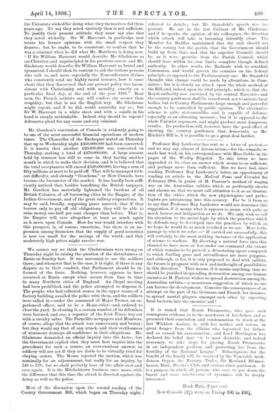We cannot say we think the Gladstonians were wrong on
Thursday night in raising the question of the disturbances at Ennis on Sunday last. It was necessary to use the soldiers there; and whenever that is the case, it is right, if there is any dispute as to their conduct, that Parliament should be in- formed of the facts. Nothing, however, appears to have occurred at Ennis except what occurs from time to time in many Northern cities of England. An illegal meeting had been prohibited, and the police attempted to disperse it. The people, who had collected stones in the upper rooms of a factory building, assailed the police with them, and the soldiers were called in—under the command of Major Turner, an ex- perienced officer, said to be a Home-ruler—and ordered to clear the yard. In clearing it, a certain number of its defenders were batoned, and one, a reporter of the Irish Times, was cut with a cavalry sabre. The Parnellite newpapers and Members, of course, allege that the attack was unnecessary and brutal ; but they would say that of any attack, and their recklessness of statement destroys all confidence in their allegations. Mr. Gladstone demanded an official inquiry into the facts ; but the Government replied that they must first inquire into the precedents for such a course, an over-cautious answer, as soldiery will not act if they are liable to be virtually tried for obeying orders. The House rejected the motion, which was nominally for an adjournment, but really for an inquiry, by 249 to 179 ; but we shall probably hear of the affair over and over again. It is the Mitchelstown business once more, with the difference that this time the attack is directed against the Army as well as the police.


































 Previous page
Previous page